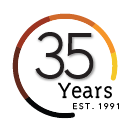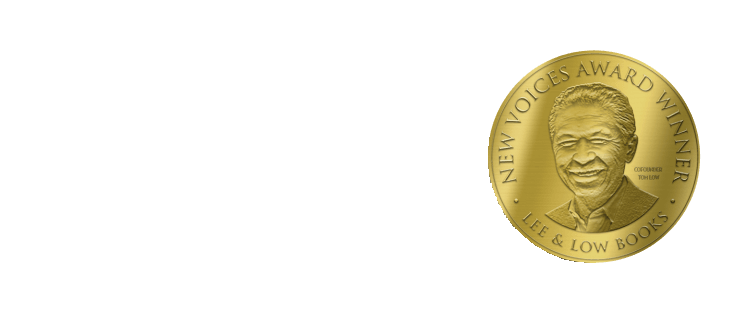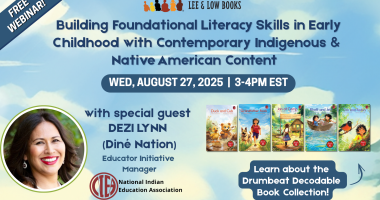 Recently, we sent a number of LEE & LOW staff members from different departments to an “Undoing Racism” workshop, held by the People’s Institute for Survival and Beyond. The People’s Institute is an organization that “is a national and international collective of anti-racist, multicultural community organizers and educators dedicated to building an effective movement for social transformation.” The workshop, jointly taught by a white leader and a leader of color, was a three-day intensive that covered everything from a history of race and racism to the power dynamics at play today in various systems. Participants were encouraged to reflect on their own experiences and identities, as well as to listen deeply as others shared.
Recently, we sent a number of LEE & LOW staff members from different departments to an “Undoing Racism” workshop, held by the People’s Institute for Survival and Beyond. The People’s Institute is an organization that “is a national and international collective of anti-racist, multicultural community organizers and educators dedicated to building an effective movement for social transformation.” The workshop, jointly taught by a white leader and a leader of color, was a three-day intensive that covered everything from a history of race and racism to the power dynamics at play today in various systems. Participants were encouraged to reflect on their own experiences and identities, as well as to listen deeply as others shared.
We decided to do this workshop because even with LEE & LOW’s focus on diverse books, we felt that our staff would benefit from specific training in anti-racism concepts. “Even though Lee & Low’s mission is to address the lack of representation of marginalized groups through publishing diverse books, the workshop hammers home how deep institutional racism goes,” said publisher Jason Low. “The intimate setting also makes issues of racism more personal. Instead of reading about racism in the paper or online you are hearing firsthand experiences, from a person sitting three feet from where you are sitting.”
The recent problems found in books like A Fine Dessert and The Hired Girl, along with long-standing problems in publishing in general, indicate that now more than ever, publishing staffs need diversity training. While the burden of mistakes can be placed on the author and illustrator, in truth publishers share an equal part of the responsibility in making sure that the books they produce are accurate and do not reinforce harmful stereotypes.
Racial insensitivity and stereotypes making it past the editorial process are expensive mistakes–in terms of both cost and impact–but they are avoidable. Below is our staff’s reaction to the workshop, plus a follow-up meeting we held in-house. Our plan is to hold monthly meetings on racism and diversity moving forward. (Note: Answers have been condensed and edited for length.)
1. What did you learn that you did not know before attending the workshop?
Stacy Whitman, Editorial: I didn’t know some of the history before. For example, I knew about indentured servitude (I actually had a couple ancestors who were indentured), but I didn’t realize the way that indentured labor and slavery were wedged against each other, and the way whiteness was created out of that time period. I had known that church had been used as a way to keep slaves in line, and I had known about slave rebellions, but hadn’t realized how those pieces fit together with indentured servitude and creation of a status of whiteness.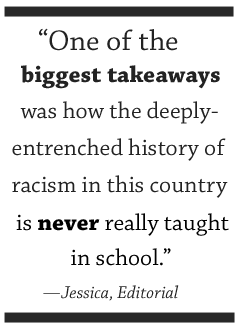
Jessica Echeverria, Editorial: One of the biggest takeaways was how the deeply-entrenched history of racism in this country is never really taught in school. This was clear from some of the participants’ reaction in learning that race was a social construct. I think back to my own education growing up in Florida, and the topics of race and racism were not examined until I was in college. And even then, they were courses I elected to take and not required for all students. So yes, racism stems from ignorance, but we should be aware that this ignorance was purposeful.
Hannah Ehrlich, Marketing: One of the main things that the workshop showed me was that having open conversations about race is just really, really hard – and rarely do we white people get it right the first time. While I had thought about white privilege before, I hadn’t really thought much about the internalized superiority that white people have absorbed over generations and generations. Because of that, even when we want to be allies, often racial conversations end up with us in a defensive stance, trying to define why we are “good” white people instead of accepting our own complicity in an unfair system and spending our time listening. Conversations that center whiteness are the default, and it takes a lot of hard work to move past that. It was moving to see this play out over the course of three days, and definitely made me more aware of how, as a white person invested in racial justice, I can be a better ally by letting go of the need to define myself as “not racist.”
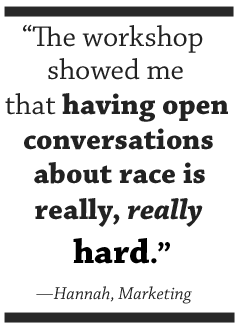 Louise May, Editorial: There was a good presentation of theories on the origins of institutional racism. I had not before seen the information put together this way. It was quite impactful.
Louise May, Editorial: There was a good presentation of theories on the origins of institutional racism. I had not before seen the information put together this way. It was quite impactful.
Jill Eisenberg, Literacy & Sales: The workshop and follow-up discussions with my colleagues have encouraged me to examine how adults present history and historical people/groups to children. Much of the workshop was spent exposing the historical narrative of America as racist and capitalistic. I was particularly disturbed about the lack of recognition and respect Native peoples had (and have). Our presenters showed us that this explicit invisibility is even written into our Constitution (Article 1, Section 2).
Rebecca Garcia, Marketing: The facilitators asked the group how many of us were gatekeepers. I had to think about it for a moment before I raised my hand. Having never thought of myself as a person with power, it was shocking to discover that I am a gatekeeper. Before that, I thought of editors as gatekeepers. After all, they’re the ones who decide what books to acquire. But since I regularly disseminate all kinds of information through social media, of course I’m a gatekeeper. Information is power.
Veronica Schneider, Literacy & Sales: Being in literacy & sales and working at a diverse children’s publisher, I think I was aware of my role as a gatekeeper. Reflecting in the workshop, however, showed me just how strong of a gatekeeper position I maintain. I choose what kind of information reaches others-from educators to children-as I develop questions and activities for our teacher guides and carefully align Lee & Low books to schools’ curricula. Conversations with educators may begin with them sharing their needs in terms of thematic units or student reading levels, but then I take that information and decide which books would ultimately work best for various academic and social-emotional reasons. Diversity is certainly an issue that is close to our hearts here at Lee & Low, but how we approach and communicate this information to others is different based on your department and on an individual basis.
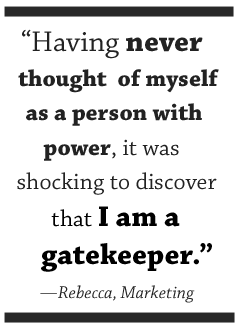 Additionally, the systemic nature of racism is a powerful concept that although I was aware of, is all the more apparent once analyzed in depth. Tracing the roots of racism to highlight the gaping holes in our knowledge in history was both eye opening and frustrating. Why aren’t we being taught this in schools? Why aren’t we openly having these discussions?
Additionally, the systemic nature of racism is a powerful concept that although I was aware of, is all the more apparent once analyzed in depth. Tracing the roots of racism to highlight the gaping holes in our knowledge in history was both eye opening and frustrating. Why aren’t we being taught this in schools? Why aren’t we openly having these discussions?
Keilin Huang, Marketing: The idea of being a “gatekeeper” really resonated with me. The LEE & LOW Facebook page has over 7,300+ likes, and whenever I post anything, I’m choosing and determining what those 7,300+ people will see. It was a realization of power that I had never thought about in-depth, and it’s a tool to use in the undoing of racism.
2. How will you apply what you have learned from the workshop to your job at Lee & Low?
Stacy, Editorial: Editorially, I’m continuing to interrogate my biases and assumptions. Thinking about further ways I can include voices of color in the projects I work on, and continuing to seek out more authors of color. Thinking about how I contribute to systemic bias, and how I can counteract it.
Jessica, Editorial: Further inspired by the workshop, I plan to continue working on books that will hopefully fill in the gaps of what’s not being taught in school. I keep thinking about Texas and the new textbooks that have whitewashed parts of US history.
Hannah, Marketing: The workshop has definitely made me more 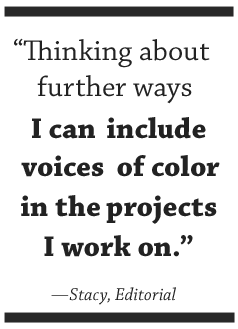 aware of my own whiteness, and how that affects the dynamics among our staff, with our authors and illustrators, and with other people we work with. It has encouraged me to examine my own culture and the lens through which I see the world – what am I missing? What am I not getting? Because I work in marketing and publicity, a big part of my job involves communication, and it’s worth exploring how racial dynamics affect that communication. Are we using language that reinforces institutionalized racism? Am I being a good ally personally, and is Lee & Low being a good ally as a company? These are all things that are important for us to consider in our work.
aware of my own whiteness, and how that affects the dynamics among our staff, with our authors and illustrators, and with other people we work with. It has encouraged me to examine my own culture and the lens through which I see the world – what am I missing? What am I not getting? Because I work in marketing and publicity, a big part of my job involves communication, and it’s worth exploring how racial dynamics affect that communication. Are we using language that reinforces institutionalized racism? Am I being a good ally personally, and is Lee & Low being a good ally as a company? These are all things that are important for us to consider in our work.
Louise, Editorial: The workshop reinforced my commitment to the need to acquire diverse stories that accurately represent stories from an insider point of view.
Jill, Literacy Specialist: We at Lee & Low Books publish and offer many books by and about Native peoples. It is critical to show that Native peoples aren’t just “were,” but also “are.” Our students need to read stories about and by Native peoples in recent times, not just suspended in a simplistic time capsule whether a folktale without additional background knowledge and proper context or a “by the way” side blurb in a history textbook. As I work closely with schools and organizations serving children, I want to make sure that the books we do have get in front of students before they internalize and perpetuate racist views on American history. These topics need to start early and often.
Veronica, Literacy & Sales: When speaking to schools, educators, teachers, nonprofits, and other organizations, we need to make sure to not only consider their requests and needs but to be clear/open about the different ways in which our titles can enrich + open their world. I need to keep stressing the importance of windows + mirrors concept in my work. This means showing non-diverse (mostly white) schools that diverse books have a place there, too.
Keilin, Marketing: One of the leaders said that as advocates of eradicating racism, everyone needs to constantly question the institution of racism. Even with little or no knowledge of something, supporters of undoing racism seek out information and learn as much as they can about a certain institution. They ask questions. They listen. As someone who works in children’s book publishing and has a means of reaching thousands of people every day, this really struck a chord with me. People who want to undo racism don’t always claim to be experts, rather they are proactive in their fight. They don’t stand off to the side and hope that things will magically be fixed. It takes effort, as all of us at LEE & LOW know, and that is something I will continue to strive to do both at work and personally.
3. What do you hope to continue to learn about and explore in post-workshop meetings with fellow Lee & Low staff?
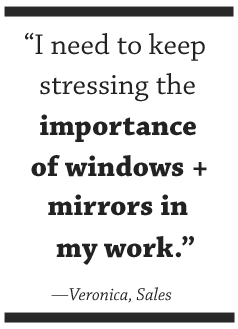 Stacy, Editorial: How to know what I don’t know, and how to share that knowledge with others in a way that they’ll listen. I guess this has been my quest, editorially, all along, but the process of the workshop in particular was interesting because while it was emotionally draining, everyone in the room was listening. Everyone was participating (even the slightly weird woman who wouldn’t shut up) and working through their resistance. There was a range of resistance, of course, but the process worked to get people talking and listening.
Stacy, Editorial: How to know what I don’t know, and how to share that knowledge with others in a way that they’ll listen. I guess this has been my quest, editorially, all along, but the process of the workshop in particular was interesting because while it was emotionally draining, everyone in the room was listening. Everyone was participating (even the slightly weird woman who wouldn’t shut up) and working through their resistance. There was a range of resistance, of course, but the process worked to get people talking and listening.
This applies to how marketing is already thinking about audience with social media and other sales channels—who we need to discuss the importance of diversity with before introducing our books.
Jessica, Editorial: I’m excited to see how our discussion will produce new and valuable content for our readers.
Hannah, Marketing: I look forward to talking more in the future with staff members about challenges we face in our respective departments. How does editorial handle a historical manuscript that uses language we deem problematic? How does sales handle administrators who don’t think their students would be interested in diverse books? Discussing these challenges as a company will help make us stronger and more aware of the issues that we face in our work, and it will allow us to develop company-wide policies to address difficult questions.
Louise, Editorial: It would be interesting to discuss what we can do to move ourselves further to toward being a “Fully Inclusive” institution.
Veronica, Literacy & Sales: Increase the sharing of articles and books about racism. Come up with ways to address problems that are occurring in the news/present day and how Lee & Low can be part of the solution.
***
Has your company undergone staff diversity training? If so, we’d love to hear about what worked and what didn’t in the comments section below.

